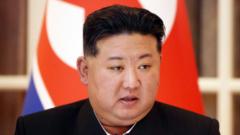North Korean state media reported that leader Kim Jong Un oversaw the successful test of two advanced air defense missiles, which purportedly possess "superior combat capability" and employ "unique technology." The announcement made by the Korean Central News Agency (KCNA) did not elaborate on the specifics of the new missile systems. The tests, conducted on Saturday, were claimed to demonstrate the missiles' effectiveness against various aerial threats, including drones and cruise missiles.
This missile test followed a significant incident on Tuesday, when South Korean forces fired warning shots at North Koreans who had briefly crossed into the Demilitarized Zone (DMZ) that divides the two nations. According to the United Nations Command, approximately 30 North Korean troops crossed this heavily fortified border. In response, Pyongyang accused Seoul of acting provocatively.
This situation emerges as South Korea and the United States conduct extensive joint military exercises in the region, underscoring the already fragile relations between the two Koreas. U.S. President Donald Trump is set to meet with South Korea's newly-elected President Lee Jae Myung, who was elected with promises to foster better inter-Korean relations. However, Kim's sister has previously rejected overtures towards reconciliation from Lee's administration.
In recent statements, Kim Jong Un condemned the military drills conducted by the U.S. and South Korea, labeling them as "most hostile and confrontational," while reiterating his commitment to expanding North Korea's nuclear arsenal. In January, North Korea claimed to have successfully tested a new intermediate-range ballistic missile equipped with a hypersonic warhead, asserting its capability to deter adversaries in the Pacific region.
Concerns have been raised by senior South Korean officials regarding potential Russian involvement in bolstering North Korea's missile technology in light of military cooperation amid the ongoing conflict in Ukraine. Former South Korean national security advisor Shin Wonsik suggested that Russia has been supplying missiles and equipment to enhance Pyongyang's air defense systems. However, it remains unclear if the recent missiles tested by North Korea involved any Russian technology.
The Korean Peninsula has remained divided since the conclusion of the Korean War in 1953, with no peace treaty signed. Despite the absence of direct military conflict for years, the tensions persist, with North Korea ranking among the world's most repressive regimes under Kim's long-standing rule.
This missile test followed a significant incident on Tuesday, when South Korean forces fired warning shots at North Koreans who had briefly crossed into the Demilitarized Zone (DMZ) that divides the two nations. According to the United Nations Command, approximately 30 North Korean troops crossed this heavily fortified border. In response, Pyongyang accused Seoul of acting provocatively.
This situation emerges as South Korea and the United States conduct extensive joint military exercises in the region, underscoring the already fragile relations between the two Koreas. U.S. President Donald Trump is set to meet with South Korea's newly-elected President Lee Jae Myung, who was elected with promises to foster better inter-Korean relations. However, Kim's sister has previously rejected overtures towards reconciliation from Lee's administration.
In recent statements, Kim Jong Un condemned the military drills conducted by the U.S. and South Korea, labeling them as "most hostile and confrontational," while reiterating his commitment to expanding North Korea's nuclear arsenal. In January, North Korea claimed to have successfully tested a new intermediate-range ballistic missile equipped with a hypersonic warhead, asserting its capability to deter adversaries in the Pacific region.
Concerns have been raised by senior South Korean officials regarding potential Russian involvement in bolstering North Korea's missile technology in light of military cooperation amid the ongoing conflict in Ukraine. Former South Korean national security advisor Shin Wonsik suggested that Russia has been supplying missiles and equipment to enhance Pyongyang's air defense systems. However, it remains unclear if the recent missiles tested by North Korea involved any Russian technology.
The Korean Peninsula has remained divided since the conclusion of the Korean War in 1953, with no peace treaty signed. Despite the absence of direct military conflict for years, the tensions persist, with North Korea ranking among the world's most repressive regimes under Kim's long-standing rule.




















